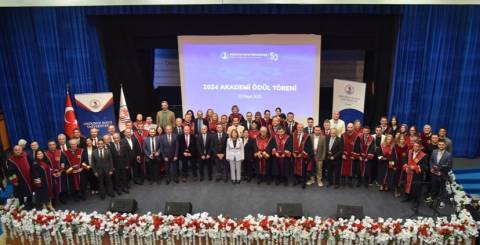OMU’s Research Hub KİTAM Holds External Stakeholder Meeting to Boost Regional R&D Partnerships
The Black Sea Advanced Technology Research and Application Center (KİTAM), operating under the umbrella of Ondokuz Mayıs University (OMU), continues to contribute to the region’s industry, agriculture, health, and biotechnology sectors with its advanced analysis and testing infrastructure. In this context, KİTAM organized an External Stakeholder Meeting with the participation of university and sector representatives.
The primary objectives of the meeting were defined as enhancing KİTAM’s effective use of government support and grant mechanisms, ensuring the sustainability of its accreditation processes, and developing its cooperation potential with similar institutions.
The program was held in two sessions.
In the first session, titled “Infrastructure, Accreditation, and Institutional Capacity Development,” participants evaluated KİTAM’s preparatory efforts for national and international accreditation processes, sustainable financing models, and inter-institutional collaborations. Attendees of this session included representatives from the KİTAM Executive Board, the Middle Black Sea Development Agency (OKA), the Turkish Standards Institution (TSE) Samsun Regional Coordination Office, the Samsun Chamber of Commerce and Industry, and OMU’s R&D Coordination Office.
The second session focused on “Knowledge Sharing and Collaboration.” Aimed at exchanging experiences with institutions that have similar infrastructure, developing joint projects, and identifying regional analysis needs, this session was attended by representatives from the Samsun Food Control Laboratory Directorate, the Black Sea Agricultural Research Institute (KTAE), the Regional Directorate of State Hydraulic Works (DSİ), SAMLAB – Samsun Advanced Analysis and Materials Laboratory, the Samsun Branch of the Chamber of Chemical Engineers (TMMOB), and the Cannabis Research Institute.
At the conclusion of the meeting, participants reached a consensus on taking concrete steps to encourage joint R&D projects among institutions, enhance infrastructure and technical capacity sharing, and strengthen cooperation to meet regional analysis needs.
OMU and KİTAM will continue to add value to the region and increase scientific productivity through such collaborations.














